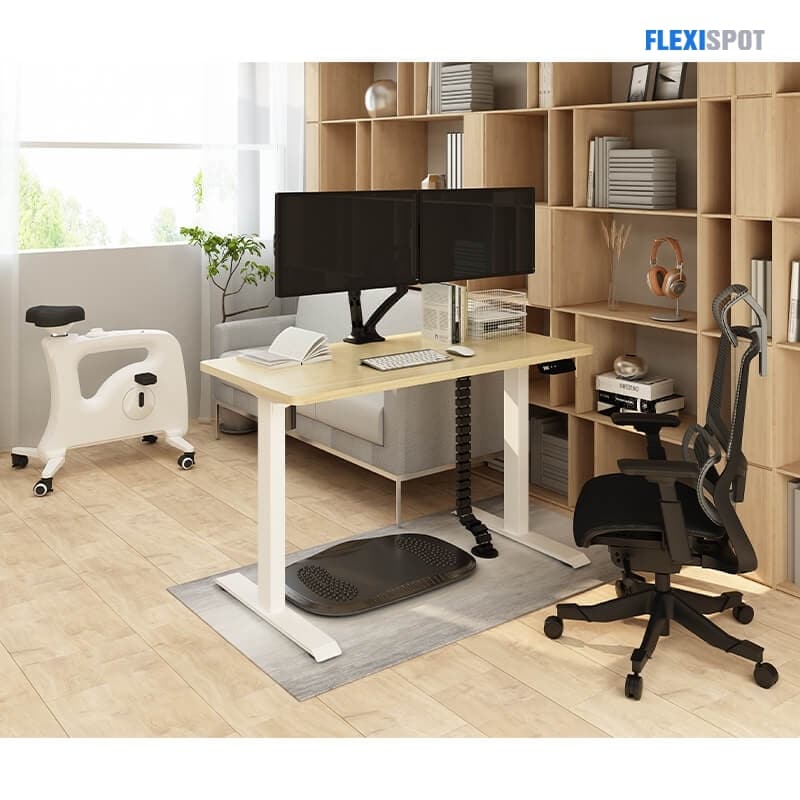While it’s the duty of an employee to get work done, it’s also the responsibility of an employer to help create a work environment that encourages productivity and efficiency. This is especially harder in this day and age of remote work where employees tackle daily distractions on their own without the extra eyes of a supervisor lingering on.
The work-from-home set-up sounded like a dream before for most but now that it’s happening, employees have found new challenges such as kids playing all around the house, dogs making noises, and extra chore responsibilities being a burden. But if the pandemic has taught us anything, it’s that remote work is possible, more cost-efficient for some companies, and lessens the carbon footprint of the workforce.
Here we round up ways on how companies can help their employees to avoid distractions while they are working at home.
1. Send ergonomic furniture to your employees.
Invest in improving your employee's efficiency and productivity as well as promoting better health by providing them with ergonomic furniture. FlexiSpot is an ergonomic company that has always embarked on a mission to improve the lives of its clientele. It has global clients such as Marriott, Bank of America, Starbucks Coffee, and IBM under its belt. The company has been in the space for more than 20 years, providing ergonomic furniture to its clients, ensuring them a painless, active and healthy experience while working, doing art, reading, writing, sitting, or standing. FlexiSpot accepts bulk orders where companies can enjoy bulk pricing, free and fast delivery, premium delivery and installation, excellent service, and more. It’s easy peasy to ship out furniture to your employees, just fill up a purchase order and wait for the furniture to arrive.
2. Have short group check-ins during the day.
While we do not encourage micro-managing which may be more detrimental than useful, schedule at least two regular check-ins during the day: one in the morning, and one in the afternoon. It will help the employer or supervisor be updated with the team’s work activity. It doesn’t have to belong, five to ten minutes of their time is enough. It would help employees get back on track with the work that they were doing because the call may serve as a reminder of the work that they need to get done.
3. Organize virtual games.
Keep the team support and togetherness high even when you are working apart. For some, these virtual games are time wasters so make sure to schedule them at the right time. Don’t do it daily and when everyone’s rushing a project on a tight deadline. Maybe it’s best to schedule it after a project when everyone is still in a celebratory mood. It can also serve as a monthly get-together and may provide prizes to the best employees of the month, which brings us to our next point.
4. Incentivize employees.
To improve efficiency while at home, give something to employees that they will be motivated to work hard for. Reward those who have worked hard and helped the company run at this difficult time. Maybe give an additional leave or provide a cash incentive to employees who work proactively and help team members willingly. The rewards system may be an old tactic but it’s still alive up to today simply because it still works. Use it to your advantage in order to reap the best results for the company as well as the employees.
5. Require employees to dress as if they’re going to the office.
The work environment changed but it doesn’t mean employees should be sloppy and take advantage of it. It’s not making the workspace restrictive but just assuring a more work-efficient environment. Many have discovered that working in pajamas can limit someone’s productivity because it feels like home and not a workspace where one has to show up professionally and looking good. So a good idea would be to require employees to dress as if they are going to the office. They don’t have to wear make-up; they just have to change into more work-appropriate tops. These could be checked through the daily check-ins. It will help create a mindset for the employees that they are working for the company even though their workspace is at home.
6. Provide employees with tools and resources.
Empower employees with knowledge. Teach them tips on how to stay productive and efficient by organizing talks and seminars. Invite professionals to talk to them so they could ask how they could fight distractions and make an area of their home a comfortable workspace. If not virtual seminars, provide employees with reading resources or video learning tools that they could access anytime in order to equip themselves with knowledge on how they could manage their time wisely and efficiently.
7. Know your employees’ living situation.
Have an open environment even while working remotely. Although you don’t see your employees, make sure they know you are available anytime for a chat if they have any concerns or questions. From the get-go, ask them about their living situation. Who do they live with? Are there other people working at the house? Is their WiFi stable? Do they have a dedicated workspace at home? What are they expecting from the company now that they work at home? Normalize as well that these living situations could change anytime so make sure to ask them again some time into working from home. They may also have new challenges that they just encountered recently and would like for you to help them address.
8. Take scheduled breaks within the day.
While it’s important to do away with distractions, it also helps employees to take breaks in order to recharge their brains after working for long hours. Schedule team mini-breaks aside from lunch so that your employees’ creativity won’t be stunted. Encourage them to take walks outside, write in their journals or meditate. Anything that they could do avoid being burnt out and work sucking the life out of them. Give them five to ten minutes before you signal them to get back to work.



